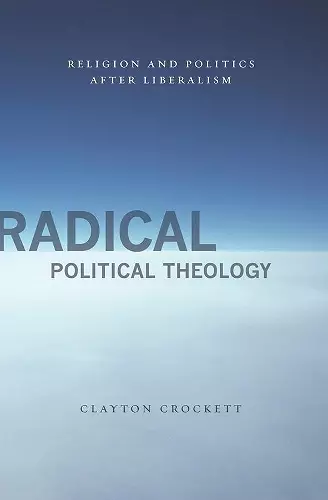Radical Political Theology
Religion and Politics After Liberalism
Format:Hardback
Publisher:Columbia University Press
Published:26th Apr '11
Currently unavailable, and unfortunately no date known when it will be back

Crockett has a knack for making unexpected and striking comparisons between thinkers who might not otherwise be immediately associated, and the result is an experience of reading and thinking that throws theology and philosophy off the usual rails in exhilarating ways. -- Ward Blanton, University of Glascow Is it possible to detach the politics of modernity from the religion of modernity and, after the exhaustion of every theory of foundation, recognize God as hope? Is it possible not to confuse religion with liberalism while the latter extinguishes itself as the dominant ideology? Can the hope for a radical democracy recognize forms for its realization? And how can hope become a weapon against the continual and ferocious reappearance of conservatism? What does such a revolution of spirit mean when every material condition of freedom is collapsing in the global crisis? Which ethics follows the extinction of the theological-political one? This book opens answers to these questions. None of us can deny searching for the answers to such fundamental problems. With strong arguments, Crockett convinces even me, a committed atheist, that it is necessary to declare it-to come out with it. -- Antonio Negri, coauthor of Empire A fresh voice rises from the fray of political theology! Inhabiting the space blasted open by death-of-God theologies, Crockett proposes an incisive alternative to the hollow secularism pretending to expel religion from politics and to the empty transcendence of the return to orthodoxy. With canny courage, his theory produces game-changing criteria for a radical democracy able--potentially--to see us through the crisis our unsustainable civilization will soon face. -- Catherine Keller, Drew University, author of Face of the Deep: A Theology of Becoming Clayton Crockett, one of the leading lights in the younger generation of radical theologians, applies his considerable theoretical skills and impressive erudition to the political question: what comes after the collapse of secularism, liberalism, and free market euphoria? In a superbly crafted argument, he draws the dark lines of an imminent catastrophe, at once economic, ecological, and political, and imagines the possibility of a radical democracy animated by a radically rethought theology. An urgently needed and important book. -- John D. Caputo, Syracuse University, coauther of After the Death of God
In the 1960s, the strict opposition between the religious and the secular began to break down, blurring the distinction between political philosophy and political theology. This collapse contributed to the decline of modern liberalism, which supported a neutral, value-free space for capitalism. It also deeply unsettled political, religious, and philosophical realms, forced to confront the conceptual stakes of a return to religion. Gamely intervening in a contest that defies simple resolutions, Clayton Crockett conceives of the postmodern convergence of the secular and the religious as a basis for emancipatory political thought. Engaging themes of sovereignty, democracy, potentiality, law, and event from a religious and political point of view, Crockett articulates a theological vision that responds to our contemporary world and its theo-political realities. Specifically, he claims we should think about God and the state in terms of potentiality rather than sovereign power. Deploying new concepts, such as Slavoj Zizek's idea of parallax and Catherine Malabou's notion of plasticity, his argument engages with debates over the nature and status of religion, ideology, and messianism. Tangling with the work of Derrida, Deleuze, Spinoza, Antonio Negri, Giorgio Agamben, Alain Badiou, John D. Caputo, and Catherine Keller, Crockett concludes with a reconsideration of democracy as a form of political thought and religious practice, underscoring its ties to modern liberal capitalism while also envisioning a more authentic democracy unconstrained by those ties.
A tour de force that should be required reading for theologians, philosophers, and critical, political and economic theorists alike. -- Brent A. R. Hege Radical Philosophy This is a thoughtful, clearly written and challenging book. Philosophy in Review ...this is a valuable work indeed that deserves a wide hearing in theological circles. -- Daniel Liechty Religion Crockett... introduces his concept of radical political theology through an impressive analysis of its relation to the rise of the Religious Right. This capacity to intertwine the theoretical and the everyday is part of the promise of [his] thought... Political Theology
ISBN: 9780231149822
Dimensions: unknown
Weight: unknown
216 pages